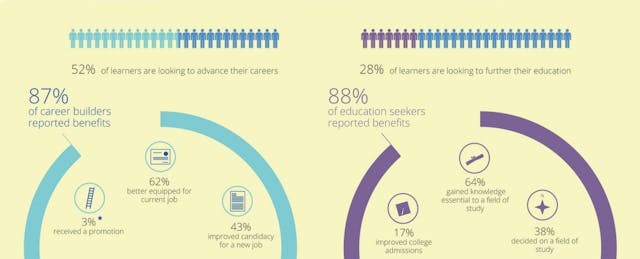Massive open online courses were built on the premise of making quality instructional content available to any learner, anywhere, anytime.
But simply increasing the number of educational opportunities isn’t enough to make an impact on learning, as Daphne Koller, co-founder and president of Coursera, frequently hears. “We’ve often been asked by a lot of people, ‘It’s great you’re providing access to education, but how are you sure you’re helping them?”
Her company has just released results from its first longitudinal study, which asked 51,954 learners whether they enjoyed any career or educational benefits three months or more after finishing a course. Overall, 72 percent of respondents reported career benefits, and 61 percent said they enjoyed educational gains.
The survey (PDF) was conducted in December 2014 by researchers from the company and the University of Pennsylvania and University of Washington, both Coursera partners. Respondents were asked to self-identify as belonging to one of two groups: “career builders” seeking job benefits including pay raise and promotions, or “education seekers” looking for academic credits.
Fifty-two percent of learners said they took courses to advance their careers. Within this group, 87 percent said they enjoyed career benefits—and 33 percent say they received “tangible” benefits, defined as a raise, promotion, a new job, or starting their own business.
“For the career seekers, the signal was pretty clear that the strongest benefits came from courses in data, technology and business,” Koller tells EdSurge. This feedback has influenced some of the company’s decisions with regards to course offerings. “It’s something that has shaped our business strategy,” she adds. “We acquired a lot of content to ensure that if someone comes on the platform, not matter what their stage of development, they have the right content and the right level.
That career-oriented learners are more focused on building applicable, skills-based knowledge shouldn’t surprise anyone. The majority of Coursera’s paid “Specialization” programs, a series of courses that offer verified certificates, focus on data science, business and programming.

Of the 28 percent who turned to Coursera to pursue education goals, 88 percent reported educational benefits, and 18 percent said they were able to earn credits towards a degree. “I was surprised the number was that high,” Koller acknowledges. These results also suggest that employers and universities are beginning to take digital badges and certificates seriously. “We’re the second-largest provider of non-university-affiliated credentials on LinkedIn,” claims Koller. (The top spot goes to Microsoft.)
Overall, the survey results were “two times better than we had hoped” when the surveys were first sent out, says Koller.
But take these results with a grain of salt: the vast majority of respondents—78 percent—held a Bachelor’s or more advanced degree. This means that the courses aren’t necessarily reaching the learners without access to education. It’s a critique that Koller often hears: “There’s this narrative that you’re helping Wall Street bankers become data scientists,” she says. “It’s true we have a lot of learners who are well-educated. But the ones benefitting the most are those in emerging economies.”
According to the report, learners from developing countries, low socioeconomic backgrounds and without bachelors’ degrees were more likely to say they received tangible career and educational benefits. Koller says these indicators are “important for our international strategy as we move beyond the early adopters, who will often be those better-off.” In the coming weeks, the company is planning to “double to triple our amount of Spanish content” as part of a broader international expansion that will focus on Latin America, China and India.
It would be a stretch to infer from Coursera’s report—which relies on self-reported data—that taking online courses leads to better employment opportunities. But the findings may change how we assess the impact of MOOCs. Just two years ago, the focus was on completion and dropout rates. Today, we should expect to see more data about the effect on learner’s lives.
It’s a conversation change that Koller welcomes. Still, she believes the company can improve on the 5 percent completion rate for learners who only take courses for free. Even for those who pay for a certificate, the completion rate ranges between 65 percent and 70 percent. “I’d love to see it at 90 percent,” says Koller.


